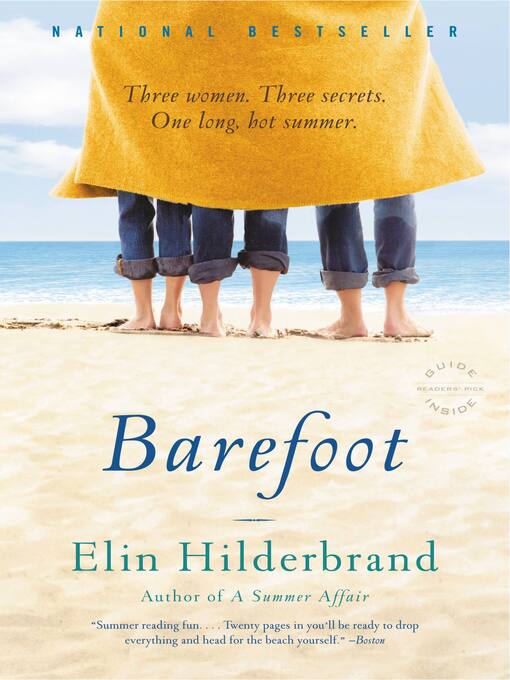Barefoot Dogs IT WILL BE AWESOME BEFORE SPRING It is the year everybody's planning to spend the summer in Italy. Tammy and Sash will take a photography workshop in Florence and Jen will take a cruise around the Mediterranean with her family, and mine will rent a house in Tuscany. We've already made arrangements to meet in Milan for a couple of days and perhaps drive to Portofino and hang out there for another day or two--Italian highways are the best, we've heard, and no one cares about speed limits there, same as here, but highways there don't suck, so everybody agrees it will be awesome. Before spring breaks, we're already taking Italian conversation over cappuccinos at Klein's on Avenida Masaryk once a week with this beautiful middle-aged Genovese woman I remember as Giovanna but I'm sure that was not her name. She looks like Diane von Furstenberg when she was in her prime, only with much less expensive clothes. She wound up in Mexico because she met some guy in Cancún, and has been trying to make a living here since, teaching Italian and any other language to foreign executives, because she's a polyglot. Whenever we want a break from class we ask her to tell us stories about her other students--she's an avid raconteur too, so she can talk and talk for hours on end--and she comes up with the wildest tales. My memories of that year have started to blur and I can only recall the story of the Danish executive who's taking English conversation and fashions a grinding, horrible accent, our teacher says, flapping her branchy hands over our cappuccino glasses as if they're logs on fire and she's trying to turn them into embers. Irregular nouns and verbs make this poor Danish lady crazy, Diane--let's call the Italian polyglot that--admits with a frown that makes the crisp features of her face look worn rather than sophisticated, so every time Diane asks her to talk about her morning routine, the Danish lady says, "Well, firrst ting rright out of my bet, I torouffly wash my teets." It is the year there's only room for Italy in our minds, and so every Thursday evening after Italian conversation, we thunder into Mixup and sort through the World Music section, looking for CDs from Italian pop singers as if we're British schoolgirls and the Beatles' real names are Umberto Tozzi and Gianluca Grignani and Claudio Baglioni and Zucchero. We buy every Italian tune we can, from Lucio Dalla's number ones to the latest from Laura Pausini--we only buy her albums in Italian, though, and pretend to ignore the appalling fact that her songs in Spanish are as mainstream as Luis Miguel's--and spend long weekend hours at Sash's or Tammy's learning cheesy lyrics by heart, mastering our accents, dreaming of Milan. It is the year we check out all of Fellini from the university's library and watch Il Postino and La Vita è Bella and Cinema Paradiso so many times we can reenact scenes from those flicks on the sidewalks of Paseo de la Reforma at 4:00 a.m. after partying at Bulldog, where we dance on the tables, vodka tonics in hand, lip-synching to No Doubt's "It's My Life" or Outkast's "Hey Ya!" or Nirvana's classic "Smells Like Teen Spirit," thinking how cheap and tacky these songs are, how insignificant they sound compared to the subtle honeylike grandeur of Fiordaliso's "Non Voglio Mica la Luna." It is the year we take internships in museums across the city because we dream of becoming artists after college. Sash and Tammy land gigs at Centro de la Imagen, and Jen at Museo de Arte Moderno, and I get the best of all, at Antiguo Colegio de San Ildefonso, helping to curate the first-ever solo exhibit of David Hockney in Mexico, which is beyond amazing and makes my three stupendous friends rattle with jealousy. I boast about my job even though all I do for those ten hours a week is mail invitations for the opening reception, organize large boxes of leaflets into brick-thick stacks, fax documents overseas, drag superheavy crates to storage--tedious and exhausting chores I've never had to do before, the novelty of which feels exciting and paramount. I feel like I'm carrying Hockney's posterity on my shoulders, like his success in Mexico depends on me. I get a taste of what the real city feels like, and I think it's not as bad as it looks from the outside. It is the year I'm nineteen. It is the year life will change for us, but we don't know any of that yet. It is the year we meet people that don't live in the same neighborhoods as us, Polanco, Lomas, Tecamachalco. It is the year we get to know real artists who rent studios in dangerous districts on the other side of the city, and it is the year we socialize with historians and anthropologists and performance artists and book editors who live paycheck to paycheck and don't have cars; these are fascinating, glamorous people who ride the subway and take taxicabs. It is a new and unexplored world within the same city we were born and have always lived, and every time we venture into it we feel as if we're crossing an invisible fence, trespassing into a forbidden side of ourselves: messier, wilder, sexier. As we start mingling with the native people of that other city, we learn it is also the year everybody's talking about kidnappings; the wave of panic of the late nineties is back with a vengeance, they announce. They're all sharing the stories they've heard, gory details about what's happened to this or that friend the last time they grabbed a taxicab. At a party in an abandoned building behind the Metropolitan Cathedral, the associate curator of Viceregal Art at Museo de la Ciudad de México tells the fresh story of a dear friend of his: It's around nine o'clock at night and this woman, a young photographer who had just returned from the Sierra Tarahumara, where she'd been working on a multimedia project to premiere at Art Basel in Miami, catches a cab, a little green-and-white Beetle, on the corner of Álvaro Obregón and Frontera, and asks the driver to take her to Barracuda Bar, "The one by Parque España," she specifies. A friend of hers is celebrating his birthday there--actually, the very curator who's telling the story--she explains to the driver in a jolly mood. The guy pulls resolutely into the traffic and feigns interest in her conversation, but when they're only one block into the ride he halts at a stoplight and a couple of fat guys step into the taxicab and fill the minuscule space of the backseat on either side of her. "My friend hasn't realized what's going on yet when these motherfuckers start beating the shit out of her," the curator says, "fists into her torso and her face as if softening a pillow, like when you're getting ready for a sweet night's sleep. Next they take her on a merry-go-round of ATMs," he explains, "forcing her to withdraw all the cash she can with a knife pinching her lower back, until she reaches the daily limit on the three cards she carries in her purse. The guy at the wheel says they need to wait until midnight to continue, and in the meantime they drive my friend around Colonia Roma and Colonia Doctores, just making time, listening to old ranchera music, whistling to the rusty tunes that pop from the speakers," the curator says. "Then one of the other guys drops something like, 'I'm fucking starving, aren't you guys?' and so they stop by a taco sudado stand to grab a bite. The hungry one takes everybody's order but my friend's," the curator says, "and out he goes to fetch the food while the other two stay inside, watching over her to make sure she doesn't escape. The hungry one comes back with a bunch of tacos wrapped in brown paper in one hand and three bottles of Coca-Cola dangling from the other," the curator says, and I can imagine the scene clearly, the sound of soda bottles clinking against each other unnervingly. "The driver pulls back into the traffic jam and the three motherfuckers have dinner while cruising streets," the curator continues, "these three pigs and my friend crammed into this little Beetle taxicab that reeks of damp taco and sweat of swine. They finish dinner but it isn't midnight yet, and they're growing bored. A couple minutes later one of them says something like, 'Hey, guys, we didn't have dessert! What if we all fuck this little cunt instead?' The three of them take a look at her, as if considering if she's worth the effort. 'Nah, she's not that hot,' the driver says, but they have nothing else to do until midnight, so in the end they all vote for the go," says the curator with a broken voice. He has to pause, he looks shaken, like he won't be able to continue the story, and everybody around him is silent looking at him with wide eyes, everybody thinking, This is a joke, right? and I feel weird because the story is so horrible it can't be true, but I realize that this is what living the real life of the city must be like, and this makes me feel grown up and wild and independent. I look at Jen and Tammy and Sash, who are listening as well, and I catch the confused signals on their faces, fascination, horror, and disbelief in their eyes. "They drive off into what looks like Colonia Portales and they park somewhere on a lightless street," the curator finally says, "and they take turns and get her as dessert. At some point midnight arrives and they resume their pilgrimage to the ATMs, but my friend's credit and debit cards are maxed out in the first attempt, and rage overtakes them. 'You're fucking broke, bitch?' the driver yells at her." The curator says his friend doesn't reply because, at that point, she's realized that crying or begging won't make a difference. She wants to believe they have nothing else to take from her. "They pull up somewhere around Eje Central, and she seems to be right because they swing the taxicab door open and throw her onto the sidewalk. She's already lying on the ground when one of them steps out of the cab and pulls down the zipper of his pants and pisses all over her. She doesn't remember feeling anything at that moment," the curator says--everybody around him, including myself, is now looking at him with tears in our eyes--"she only gets to hear the other motherfuckers cracking up, howling in celebration inside the taxicab. The guy finishes, squats down by her side, and whispers in her ear, 'We're keeping your purse, muffin, so if we feel like visiting you one of these days we know where you live.' He gets back in the cab, and she watches from the corner of her eye as the little Beetle fades away. And here comes the worst part of the whole thing," the curator says. "A sense of glee she'd never experienced before takes over her when she sees them disappear into the night." Excerpted from Barefoot Dogs: Stories by Antonio Ruiz-Camacho All rights reserved by the original copyright owners. Excerpts are provided for display purposes only and may not be reproduced, reprinted or distributed without the written permission of the publisher.



